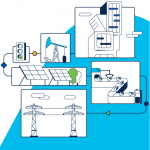The idea that technology can and should make the world a better place has been said so often that it can come off as a cliché. As tech professionals we intend to make a difference, but serious action often gets sidetracked by day-to-day distractions.
Manifesting hope is about making our intentions a priority. It’s about having the courage to take serious action and hold ourselves accountable, just as we do for our business. Combining hope with technology and passion to make a difference for everyone is what I call ‘Digital Hope.’
Like many, I truly believe we have a responsibility to not only help customers transform their businesses, but also to transform our healthcare systems, build safer communities, and help foster a worldwide digital neighborhood.
The creativity and innovation that can be unlocked by digitization opens up the art of the possible. And it’s possible for all of us, both as individuals and as representatives of the technology industry, to make Digital Hope a reality.
How I try to give back
I am as unlikely an IT guy as you’ll ever meet. As a young man in New Zealand I began working as a builder’s apprentice after my father died. A few years later I had just finished building my Mum a house and was in-between jobs. So, she enrolled me in a computer course at the local community college. I said, ‘Mum, why did you do that? I’m a builder.’ At the time I knew less than nothing about computers or the Internet. The closest thing I had access to was a Commodore 64 gaming system. I remember taking notes in class: ‘This is a mouse and this is a keyboard.’ But this impulse on my Mum’s part ultimately changed my life.
I realized early on that employment in the digital world opened doors and gave me choices I would never otherwise have had, and that many of my mates from high school didn’t have. It gave me Digital Hope. As I worked my way up the ranks professionally, I looked for ways to use my knowledge and resources to give something back. I focused on the areas I am most passionate about. One of those areas is mental health and well being.
People tend to think of New Zealand as a chill place, but it has one of the highest rate of youth suicide in the OECD. In part that’s because of isolation and living in remote areas where mental health resources are scarce, but also because of the pressures our kids are feeling in today’s high-performance society. It’s especially critical in minority communities, where people already feel like outsiders and there’s a cultural stigma associated with talking about things like this.
So we got involved with Youthline, an organization that offers crisis support to troubled Kiwi youth. Cisco donated more than $1 million worth of Webex video meetings, and had one of our channel partners deploy it for free across New Zealand, so counselors could talk face-to-face with kids about the things they couldn’t tell any of the adults in their lives.
But these problems are not just limited to New Zealand. That’s why I’m also an investor in Mentemia, a start-up focused on the global problems of anxiety and stress. Mentemia’s ten-year goal is to improve 100 million lives and save 100,000 souls by combining advanced AI with deep knowledge of mental health.
How can you get involved?
My purpose in writing about these things is not to demonstrate what a great person I am. It’s to share that we all have skills and resources we can contribute to address issues we’re passionate about. I want to put some urgency behind using technological advancements to help solve some of the world’s wicked problems.
There are three things we all can do to raise our hands, take action, and become part of the solution:
* Find a problem you’re passionate about. If nothing comes immediately to mind, Singularity University has taken the UN’s global development goals and identified a dozen global grand challenges, from energy and the environment to food and shelter, that could desperately use your help.
* Don’t try to do it on your own. Join others in your community who are already working the problem. Ask them how to get started. Involve your peers, partners, investors, customers, and the leadership of your company.
* Take action now. Don’t wait until your calendar clears up or for a new fiscal year’s budget. These problems aren’t waiting, you shouldn’t either.
The technology community is rich with the kind of expertise, experience, intellectual property, relationships, and funding most not-for-profits can only dream of. It’s time to put all of these resources to work so we can – yes – make the world a better place. For all of us.
Dave Wilson is vice president of global IoT sales for Cisco. Look for more about what Cisco is doing to foster Digital Hope in a future post.

Love this! “Combining hope with technology and passion to make a difference for everyone is what I call ‘Digital Hope.’